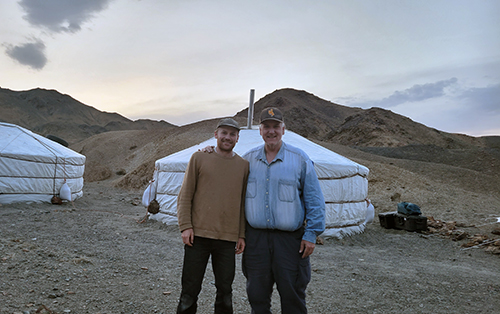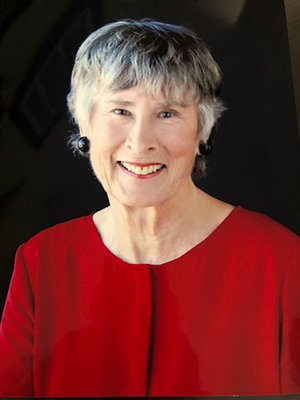Parallells Between Wyoming, the West, and the World
The Partnership of Polly Weber Smith and John Koprowski

Dean of the Haub School of Environment and Natural Resources John L. Koprowski points
out that Mongolia has much in common with Wyoming.
“Mongolians have a deep connection to their land,” says John. “For generations, their livelihoods and values have been profoundly connected to their environment. Mongolia’s landscape includes vast sweeps of blue sky, high elevation, grasslands, steep mountain ranges, national parks, and even stunning desert land. Like Wyoming, energy and mining are their biggest industries, followed by tourism.”
The parallels in environment, cultural ideals, and growing industries have contributed to a partnership between the University of Wyoming and Mongolia. Global engagement opportunities like this have been made possible through an exceptional friendship and partnership between Dean John Koprowski and donor Polly Weber Smith.
“After 20 years on Wall Street, I wasn’t sure what my retirement would look like,” says Polly. “Meeting Dr. Koprowski in 2018 while he was at the University of Arizona quickly brought the future into focus.”
Polly’s support for the University of Wyoming is unique. She and John do not share similar professional degrees. She isn’t a UW alum, and in fact she’s never lived in Wyoming.
“Polly has a passion for community-based conservation and research that cultivates ideas that lead to good policy decisions,” says John. “We’ve come together because we share the same sense of connection to our wild and working lands. She’s been a strong partner in helping maximize our impact.”
When John relocated to the University of Wyoming, Polly continued to support his efforts because she believes in his work. Her generosity to the Haub School has supported students and programs through several funds: the John Koprowski Excellence Fund, the John Koprowski Research Fellowship Fund, the John Koprowski Mongolia Research Fellowship Fund, and the Graduate Research Scholarship in Sustainable Landscapes and Livelihoods.
 Recently, Polly gave a gift that established the International Wildlife Conservation
Chair in honor of John. Following his retirement, the chair will be renamed to the
John L. Koprowski International Wildlife Conservation Chair and will provide the opportunity
for the Haub School and UW to have impact in perpetuity by competing to recruit, retain,
and support the very best.
Recently, Polly gave a gift that established the International Wildlife Conservation
Chair in honor of John. Following his retirement, the chair will be renamed to the
John L. Koprowski International Wildlife Conservation Chair and will provide the opportunity
for the Haub School and UW to have impact in perpetuity by competing to recruit, retain,
and support the very best.
“Gifting funds to John’s vibrant and wellmanaged endangered species programs, both international and national, began slowly,” says Polly. “John’s skills as a manager of his numerous international research projects and mentorship to his numerous researchers were impressive. More impressive were the quick successes of his programs and his people.”
John’s work has earned him considerable international recognition. He teaches courses in Ecuador, Mongolia, China, and Italy. His research focuses on ecology, conservation, and management of biodiversity with a communitybased approach. His work has created partnerships in South America, Europe, Asia, and South Africa.
In Nepal, John helped to conserve freshwater dolphins through research that connected scientists with local fisherman along the Ganges River. His group’s research works to protect Andean bears in the highest mountains of Colombia by working with ranchers and farmers to find strategies that permit economic opportunity and promote conservation. John has been instrumental in the university’s relationship with Uzbekistan, establishing new partnerships and creating exciting opportunities.
The Haub School attracted John because of the unit’s fundamental belief that the great challenges in our natural world require collaborative efforts that bring people together from all perspectives to find sustainable solutions for our wild and working lands.
In his teaching, John empowers and emboldens his students through interdisciplinary and experiential learning. He has written more than 200 peer-reviewed scientific articles and books and has worked with over 50 graduate students to provide data-informed solutions to conservation challenges.
Through his teaching, expertise, and research, John has earned significant respect in international wildlife conservation. He is a fellow of the American Association for the Advancement of Science, the Wildlife Society, and the Linnean Society of London. Recently, his lifetime of work was recognized through the Aldo Leopold Memorial Award— the highest honor bestowed by The Wildlife Society.
“Deciding to make such gifts in one’s lifetime is a big decision,” says Polly. “It is a decision I have never regretted. It’s an honor to be a partner and see how John’s work is benefiting not only the imperiled animals here in the United States but those around the world.” The International Wildlife Conservation Chair is a gift that will have an impact far beyond Wyoming. Sustainable solutions in biodiversity are achieved through the work of a community. Polly’s passion for conservation along with her trust in John’s efforts are laying the groundwork for students and faculty who are wanting to make a difference without borders. Their partnership has built the momentum, which has fostered significant impact within the University of Wyoming and beyond.
“This chair is creating even greater opportunity for students, faculty, and the university to connect and share our expertise with the world,” says John. “We do such great things here in the state and through the university. Our approaches, successes, and expertise really can have a much greater impact on Wyoming, the West, and the world. Great opportunity exists to export our knowledge in ways where we are not losing that knowledge but are instead being recognized as a leader and attracting and retaining the world’s best. That is what this gift enables us to do for generations of Cowboys who train to have impact during their time at UW.”
If you are interested in joining the efforts of John Koprowski and the Haub School of Environment and Natural Resources, please contact John Paradis at (307) 766-3809 or email jp12@uwyo.edu.
